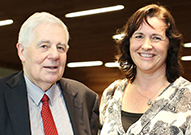
AUCKLAND (Pacific Media Watch / AUT University): A deeper understanding of Asian and Pacific cities and the economic development of countries in the region will only come from understanding the social foundations of development, says AUT University's Professor Ian Shirley.
Rather than studying the diverse cities of the Asia-Pacific region through a Western academic lens, Professor Shirley is adamant that we need to understand the formation of metropolitan cities from ‘insiders’ – those who live and work in the cities and understand the historical conditions and forces that have shaped their modern economies.
In 2006 Professor Shirley established the Asian and Pacific Development Programme, recruiting researchers in 16 cities across the region to study and document the economic and social trends of their metropolitan cities.
The first phase of the programme has recently concluded, with the publication of Asian and Pacific Cities, a book co-edited by Professor Shirley and AUT University’s Dr Carol Neill.
The publication was launched at AUT this week, at a celebration attended by more than a hundred local and international stakeholders.
By tracking the economic and social trends of their own cities, contributors have identified the ‘drivers’ of development within the metropolitan centres of the region.
City profiles
The sixteen cities profiled include Tokyo, Shanghai, Manila, Jakarta, Bangkok, Singapore, Santiago and Auckland.
The research programme utilises each city as a ‘portal’ into the diverse countries of the Asia-Pacific region – a region that covers a third of the Earth’s surface and contains half of its population.
Professor Shirley says the wider research programme is distinguished by its collaborative approach.
Rather than comparing ‘snapshots’ of development, the team is working to build a research program that focuses on the dynamics of development.
“By adopting an integrated approach linking the different cultural traditions with political, economic and social realities, the research teams were able to construct a comprehensive genealogy of their metropolitian cities, as well as the regions in which these cities are embedded,” the professor explained.
Professor Shirley says the research teams have now established a significant platform for understanding a wide range of cities in the region and have collectively built a framework for an examination of urban policies and practices.
Future projects
The next phase of the research programme will focus on a range of projects identified by the research teams at the 2011 forum in Vietnam.
These projects include: trade and investment policies; local economic initiatives; public policy and public administration;and disparities between different age groups and populations.
“There are huge disparities between different countries in the region, between different cities, between urban and rural communities and between different ethnic, social and economic groups,” says Professor Shirley.
“Despite the fact that major advances have been made in addressing poverty and literacy rates in the region, economic and social disparities will be a significant element in phase two research projects."



